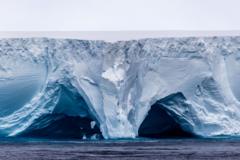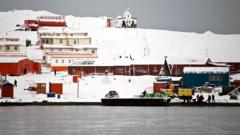Scientists and locals are on high alert as the iceberg, known as A23a, looms close to the British island, historically affecting wildlife feeding patterns.
Giant Iceberg Approaches South Georgia, Threatening Wildlife

Giant Iceberg Approaches South Georgia, Threatening Wildlife
A massive iceberg from Antarctica is on a collision course with South Georgia, endangering local penguins and seals.
The world's largest iceberg, dubbed A23a, is currently drifting towards South Georgia, a remote British territory famed for its diverse wildlife, now facing potential peril from the looming ice giant. The iceberg is approximately 173 miles (280km) away and is gaining speed as it moves northward, attracting concern from scientists and locals alike.
In past instances, giant icebergs have devastated colonies of penguins and seals by blocking their access to vital feeding spots. "Icebergs are inherently dangerous. I would be extraordinarily happy if it just completely missed us," remarked Simon Wallace, a sea captain navigating the waters around South Georgia.
Monitoring efforts have intensified as the iceberg approaches, with experts diligently analyzing satellite imagery. A23a, over 3,500 square kilometers in size (about the size of Cornwall), measures towering cliffs reaching up to 1,312 feet (400m). After calving off the Filchner Ice Shelf in Antarctica in 1986, it became trapped in a vortex until breaking free last December, marking its final journey.
The ice giant is now showing signs of deterioration, losing chunks and presenting potential hazards to marine life. In 2004, another iceberg, A38, caused significant mortality among local bird and seal populations when it grounded, leaving behind a landscape of ice that blocked access to critical feeding areas.
Marine ecologist Mark Belchier emphasizes the ongoing threat from icebergs like A23a to both wildlife and local fisheries. The unpredictable nature of these icebergs is compounded by climate change, although A23a's detachment was not directly linked to rising temperatures due to its age.
Sailors and fishermen navigating the treacherous waters report increasing encounters with icebergs. "It is in bits from the size of several Wembley stadiums down to pieces the size of your desk," said Andrew Newman of a local fishing company, highlighting the ongoing risks to marine operations.
With climate change making Antarctica's ice sheets less stable, more icebergs are likely to break off in the future, posing ongoing challenges for wildlife and maritime activities alike. However, A23a offers unique research opportunities; during a recent expedition with the British Antarctic Survey, scientists collected important data on how melting icebergs can impact ocean chemistry and the carbon cycle.
As A23a nears South Georgia, the world watches with anticipation and concern, knowing that nature's unpredictable forces are on display once again while hoping the looming iceberg does not spell disaster for the region's cherished wildlife.



















